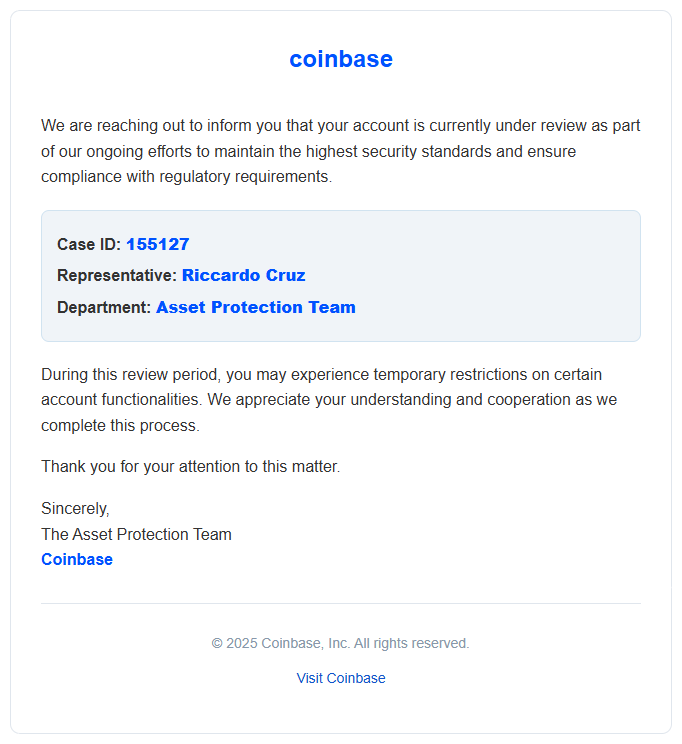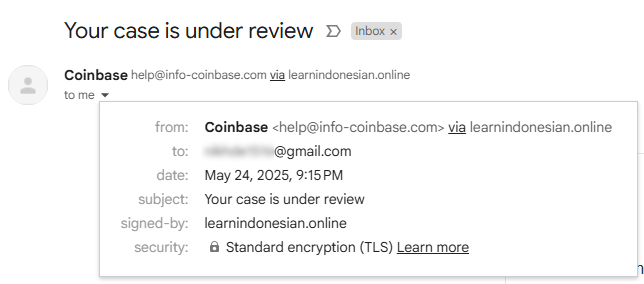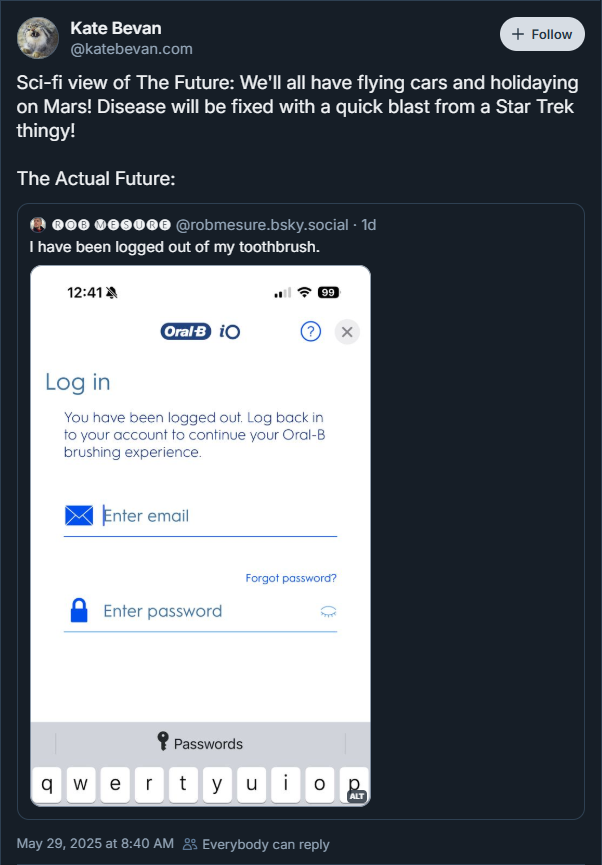Uncategorized
State of Crypto: Someone Tried to Scam Me (Probably)

Coinbase won’t call customers to warn them that their accounts may have been compromised. It’s a common scam vector. Still, someone tried it on me.
You’re reading State of Crypto, a CoinDesk newsletter looking at the intersection of cryptocurrency and government. Click here to sign up for future editions.
Account compromise
The narrative
Last weekend, an unknown California number called me. A helpful gentleman informed me that my Coinbase account had been compromised during its recent data breach and he was there to assist me in not losing my assets.
Oh no, the horror!
Why it matters
All right, so obviously this is a scam. Right after hanging up with this supposed help desk agent, I texted a Coinbase spokesperson to verify that at no point would the exchange call a customer to tell them their account was compromised. It’s scam 101 — if you’re getting a phone call informing you that your account’s been compromised, whether at a crypto exchange, a bank, the IRS, whatever, it’s a scam. Do not share your personal details and do not provide any passwords if you get a call like this.
There were a few flaws in the attempt to get me to, presumably, move my funds from my supposedly compromised Coinbase account to another address. But I’m hopeful that this can be a useful teaching moment for the nearly 70,000 people who have been affected by Coinbase’s recent breach disclosure, as well as anyone else who receives a phone call claiming their information has been compromised. Here’s how this went down.
Breaking it down
Let’s start from the beginning. On Saturday, May 24, I received a call from a number I didn’t recognize to my personal phone, not my public-facing work number. It being a weekend, one where I was actually visiting family in another state, I didn’t pick up. Then the same number called back and I still didn’t pick up (yes I know, riveting, but it’s 2025 and you can leave a voicemail or text).
Ten minutes later, I received a third call from a different number, which I did pick up because at that point I was curious.
A fast-talking gentleman who called himself Riccardo told me he was part of Coinbase’s Actions and Protections Department and that he was reaching out because my Coinbase account information had been compromised and a new email had just been added to my account.
I was pretty confused, for reasons I’ll get into below. But I was also intrigued because there were immediately four red flags. For simplicity’s sake, I’ll refer to the caller as «the agent» from here on out, but to be absolutely clear, I doubt he is an actual customer service agent, representative or other employee of Coinbase, and he certainly was not reaching out to me as an authorized representative of the exchange.
First off, the phone call itself is a big red flag. Coinbase will never call a customer about a breach, but rather will contact customers via email, it previously said in a tweet.
This is actually standard. The Federal Trade Commission website notes there is a vast range of scams wherein someone will call you, and numerous other companies have warnings that their employees will never proactively call a customer about account issues.
The agent I spoke to said they would freeze my account for 24 hours to ensure no funds could be stolen (thanks, I guess?) and that a supervisor would reach out to me (I continue to wait for this supervisor to call). This supposed freeze on my account can be extended to three months if there are multiple failed login attempts.
To wrap up the call, he said he’d send me an email summarizing all the details we’d discussed. On Saturday night, I received an email with the subject line «your case is under review.»
The follow-up email this very helpful customer service representative sent was extremely informative.
For one thing, the email address they had associated with my account is a public-facing address, but is not the email address attached to my actual Coinbase account (in fairness, I forgot that part until I tried to find my login information a few days later).

Gmail initially (correctly) flagged this email as spam. I moved it to my inbox, where Gmail then showed me that the sender (help@info-coinbase.com) was not the actual sender — the email arrived via learnindonesian.online. Even the info-coinbase.com part is sketchy — for one thing, Coinbase’s website is coinbase.com, though it does send emails from info@info.coinbase.com — still, you wouldn’t expect a hyphen in a support email domain. For another, the info-coinbase domain was first created in November 2024 (according to an ICANN lookup) and isn’t a real website.

The email headers were also not super helpful in terms of providing any sort of identifying information, but they did confirm that the sender appeared to have tried to obfuscate their information.
Curiously, the «Visit Coinbase» link at the bottom appeared to link to the actual Coinbase website and there do not appear to be any hidden embedded images or other attached files in the email at all. I’m not totally sure what’s going on there. A real scammer could have embedded a virus of some sort into the email or even a tracking pixel. Another common tool scammers might use is putting in a phishing link in place of a legitimate one in an email, tricking the user into going to a website intended to steal their login information (this is not legal, technical or any other sort of advice; if you decide to try and scam somebody using information you gleaned from this newsletter, stop it).
While scammers might sometimes know how much their intended victims have in a wallet or account, the person who called me did not appear to have that information (as I have zero crypto in my Coinbase account).
I called the number back on Friday to see what might happen. No one picked up. I guess my account must be secure now.
Stories you may have missed
- Stand With Crypto Removes Soulja Boy From NJ Governor Rally After Discovering Sexual Assault Fine: Stand With Crypto announced Soulja Boy and 070 Shake would headline a «get out the vote rally» next week ahead of New Jersey’s governor primary election. SWC removed Soulja Boy a day later after discovering he was found liable for sexual battery and assault charges and ordered to pay $4 million last month, in a case stemming from 2021.
- SEC Task Force Chief Says Crypto Traders Need to be Growups, Not Cry to Government: SEC Commissioner Hester Peirce told the Bitcoin 2025 Las Vegas audience that it’s fine to invest in speculative assets, especially if there’s no federal regulator with close oversight, but those investors can’t ask for a bailout when prices sink.
- U.S. House Republicans Officially Introduce Crypto Market Structure Bill: House Republicans have formally introduced the Digital Asset Market Clarity Act, its market structure bill, just weeks after circulating a discussion draft.
- Crypto Staking Doesn’t Violate U.S. Securities Law, SEC Says: The SEC’s latest staff statement looks at staking and how the securities regulator might evaluate that part of the crypto ecosystem.
- SEC Files to Dismiss Long-Running Lawsuit Against Binance: The SEC and Binance filed a joint stipulation to drop the regulator’s case against Binance.
- Suspects in Manhattan Crypto Kidnapping, Torture Case Plead Not Guilty as Investigation Widens: News broke over the weekend that a crypto investor had been kidnapped and tortured for his Bitcoin keys. Two suspects accused of perpetrating the kidnapping have been arrested and pled not guilty.
- Trump’s Memecoin Dinner Questioned by Top Democrat on House Judiciary Committee: Jamie Raskin, the top Democrat on the House Judiciary Committee, wrote a letter to U.S. President Donald Trump calling on him to publish the names of his guests at last week’s memecoin dinner.
This week

Friday
- 15:00 UTC (11:00 a.m. ET) A federal judge held a telephone hearing to assess Roman Storm’s defense argument that the Department of Justice may have withheld information. The judge ruled that in her view, the DOJ did not have to review its materials and had not withheld information that rose to the level of affecting proceedings.
Elsewhere:
- (The Washington Post) The White House published a «Make America Healthy Again» report that cited nonexistent studies and references — with telltale signs that AI may have been used to generate at least some parts of the report.
- (The Federal Reserve) The Fed said 8% of adults who responded to a survey said they held cryptocurrency in the U.S., down from 12% four years ago.

If you’ve got thoughts or questions on what I should discuss next week or any other feedback you’d like to share, feel free to email me at nik@coindesk.com or find me on Bluesky @nikhileshde.bsky.social.
You can also join the group conversation on Telegram.
See ya’ll next week!
Uncategorized
American Bitcoin, Backed by Eric and Donald Trump Jr, Pulls In $220M to Accumulate BTC

American Bitcoin Corp, a Miami-based mining company majority owned by Hut 8 (HUT) and backed by the Trump family, has raised $220 million from accredited investors, according to a filing with the U.S. Securities and Exchange Commission.
The raise topped its target of $200 million, and it also accepted about $10 million worth of bitcoin (BTC) in lieu of cash, the filing details. The placement netted roughly $215 million after fees. The firm sold 11,002,954 Class A shares in total.
The fresh capital will be used add bitcoin to the firm’s treasury and upgrade its fleet of mining machines.
The sons of U.S. President Donald Trump, Eric and Donald Trump Jr, owned American Data Center, which merged with American Bitcoin. According to earlier reports, American Bitcoin is 80% owned by Hut 8, with the Trump brothers owning 20%.
In May, the firm announced it is vying a public listing by merging with Gryphon Digital Mining (GRYP). Hut 8’s share are down 0.86% in pre-market trading at $18.44.
Read more: Trump Family-Backed American Bitcoin to Go Public via Merger With Gryphon Digital
Uncategorized
Bitcoin Miner IREN Hits 50 EH/s Midyear Hashrate Target, Eyes AI Expansion

Australian bitcoin (BTC) miner IREN (IREN) said it reached its midyear hashrate target of 50 exahashes per second (EH/s) installed self-mining capacity.
The growth from 31 EH/s at the end of last year is anchored by IREN’s 750MW site in Childress, Texas, the company formerly known as formerly Iris Energy, said in an announcement on Tuesday.
Sydney-based IREN’s attention is now on Horizon 1, a 50MW AI data center at Childress, which it says it set for delivery in the fourth quarter.
Hashrate is a measurement of the computing power behind the Bitcoin network. The higher a company’s hashrate, the higher its chances of mining new BTC and receiving the rewards that come with it. Rival CleanSpark (CLSK) also reached the milestone of 50 EH/s last month.
«With 50 EH/s of mining expansion complete, we’re now turning to our next frontier, leveraging the same execution discipline to scale AI infrastructure across high-growth compute markets,» co-founder Daniel Roberts said in the statement.
IREN’s Nasdaq-listed shares closed over 4% higher at $14.57 on Monday. They were recently 4.12% lower in pre-market trading.
Uncategorized
Strategy’s Perpetual Preferred Stocks May Be Front Running S&P 500 Inclusion

Disclaimer: The analyst who wrote this article has shares in Strategy (MSTR)
Strategy’s (MSTR) perpetual preferred shares may be anticipating the bitcoin-accumulation company’s inclusion in the S&P 500 index after the largest cryptocurrency posted a record-high monthly close at a price some analysts calculate lifted quarterly earnings to a level that qualifies it for the U.S. equity benchmark.
That may not be the only reason for their popularity, however. The stocks all offer yields above the Federal Reserve’s target rate of 4.25%-4.5% at levels that may be enough to attract investor interest, especially given President Donald Trump’s calls for U.S. interest rates to be lowered.
While the official announcement regarding S&P 500 inclusion is not due until September. Still, on Monday, MSTR rose 5%, pushing the stock above $400, its highest since May 22. More notable gains came from the perpetual preferred shares, STRK, which climbed 15% and STRF, which added 7.5%. The STRD shares rose 3%.
Bitcoin BTC ended June at $107,750, a level that translates into a positive earnings impact of about $11 billion for Tyson Corner, Virgina-based Strategy, and boosts earnings per share to around $39.50, according to MSTR analyst Jeff Walton. That’s enough for it to post a net positive figure from the most recent four quarters, the last barrier it faced to be added to the S&P 500.
Shares often rise when they join, or are expected to join, the benchmark because membership opens up greater demand from institutions who are not allowed to invest in companies that haven’t made the cut.
STRK’s advance pushed the price to $121 with an effective yield of 6.6%. Since its Feb. 6 launch, STRK has delivered a 42% return, outperforming both bitcoin’s 11% jump and the S&P 500’s 2%. The figures exclude dividend payments associated with these products. STRF now offers an effective yield of 8.8% and STRD 11.1%.
Altogether, these developments raise the question of whether recent market moves represent front running ahead of a possible inclusion of MSTR in the S&P 500 alone.
Read more: Strategy Could Be Eligible for S&P 500 Inclusion in June if Bitcoin Closes Q1 Above $96K
-

 Business9 месяцев ago
Business9 месяцев ago3 Ways to make your business presentation more relatable
-

 Entertainment9 месяцев ago
Entertainment9 месяцев ago10 Artists who retired from music and made a comeback
-

 Fashion9 месяцев ago
Fashion9 месяцев agoAccording to Dior Couture, this taboo fashion accessory is back
-

 Entertainment9 месяцев ago
Entertainment9 месяцев ago\’Better Call Saul\’ has been renewed for a fourth season
-

 Business9 месяцев ago
Business9 месяцев ago15 Habits that could be hurting your business relationships
-

 Entertainment9 месяцев ago
Entertainment9 месяцев agoDisney\’s live-action Aladdin finally finds its stars
-

 Entertainment9 месяцев ago
Entertainment9 месяцев agoNew Season 8 Walking Dead trailer flashes forward in time
-

 Tech9 месяцев ago
Tech9 месяцев ago5 Crowdfunded products that actually delivered on the hype





